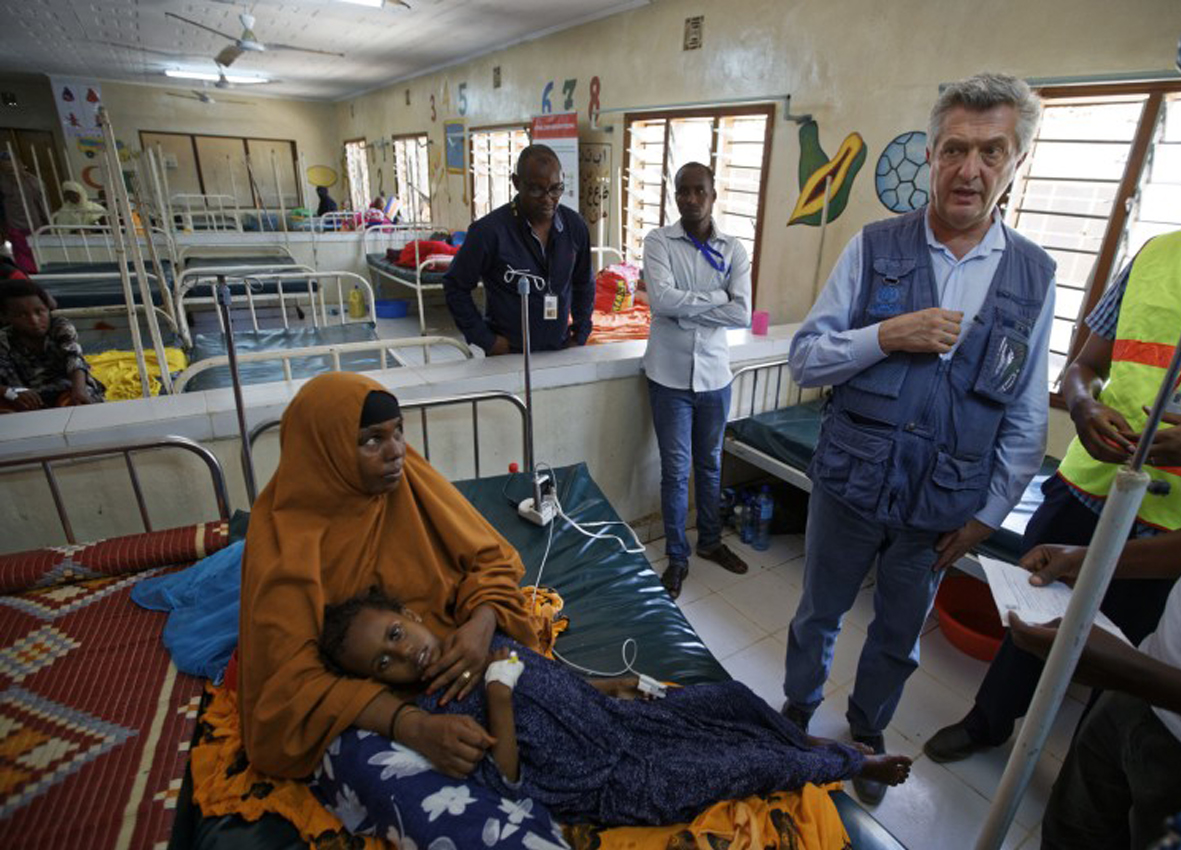
UN refugee chief sees more 'poison' focused against migrants
UNITED NATIONS -- The U.N. refugee chief said Tuesday he has never seen "such toxicity, such poison" in politics, the media, social media and every day conversation focused on refugees, migrants and foreigners.
U.N. High Commissioner for Refugees Filippo Grandi said the March 15 attack on a mosque in Christchurch, New Zealand that killed 50 Muslim worshippers was the result "of that toxic language of politics."
Grandi urged countries everywhere to take "a leaf from the exemplary response of the people and the leadership of New Zealand" in responding to the "toxic trends" by restating the values that underpin global solidarity and "reaffirm that our societies will not be really prosperous, stable and peaceful if they do not include all."
An Australian white supremacist, Brenton Harrison Tarrant, who has been charged with the mosque killings which included many immigrants, livestreamed the shootings and sent out a lengthy manifesto. New Zealand Prime Minister Jacinda Ardern has said the world has been stuck in a vicious cycle of extremism which must end, and she will never utter his name and give his views the oxygen he wanted.
Grandi told the Security Council "there is unprecedented stigmatization of refugees and migrants," and responses are increasingly inadequate.
He said he has worked with refugees for over three decades and has seen "much solidarity, even heroism in some of the responses that are provided on the ground" to help them.
And "that solidarity is still very strong" in many parts of the world, from African villages to the border between Bangladesh and Myanmar, to communities in Latin American helping Venezuelans, Grandi said.
"But also in these 3 1/2 decades I have never seen such toxicity, such poison in the language of politics, in media, in social media, even in everyday discussions and conversations around this issue -- toxicity that focuses sadly, tragically, often, on refugees, on migrants, on foreigners," he said. "That should be of concern to us all."
Grandi added that "many politicians believe that -- and I think they are proven right -- that doing this expands their consensus."
But he said this is wrong and unfair to people "that are fleeing because they seek safety from war, from persecution."
He said the mosque attacks in New Zealand showed this has become an issue of security and stability for all countries -- and governments need to address the issue of language on social media and in politics.
"It is an issue if left unchecked may have very grave consequences, not only for our work but for the world in general," Grandi warned.
Source: https://mainichi.jp/english/articles/20190410/p2g/00m/0in/073000c
 English
English Japan
Japan

define ivermectin ivermectin buy online ivermectin oral dosage for dogs what age puppy ivermectin
male enhancement pills wholesale prices belviq 10 mg are vitamins fda approved viagra women sildenafil coupons cvs silverscript part d formulary
neurontin and klonopin neurontin brand name 800 mg is neurontin a controlled substance what is gabapentin used for pain
priligy mercado libre priligy buy online priligy before or after food how does priligy work
neurontin uso does neurontin lower blood pressure what is the brand name for gabapentin
dapoxetine hydrochloride india sildenafil dapoxetine tablet super p-force 2017 reddit where buy priligy
modafinil sjs provigil teva does modafinil increase heart rate how to get a prescription for provigil
erorectin gnc cialis 800mg black reviews viagra cost when will cialis go generic walmart drug prices 2018 brand cialis overnight delivery viagra pill cvs viagra coupons viagra 100mg tablets retail price what is viagra legitimate viagra sites generic viagra us pharmacy natural vitamin supplements for women homemade viagra pfizer vgr 100 street value pink pill drug prescription female libido enhancer natural viagra for men cheap generic drugs from india red male enhancement free sample contrave diet pill prices women viagra pill identifier lookup 5 mg cialis generic 100 mg viagra lowest price viagra price cute pink dresses for women average price for viagra goodrx viagra pill identifying guide
zithromax reviews buy azithromycin online cheap can you drink alcohol on azithromycin azithromycin what is it for
plaquenil and pregnancy plaquenil 200 mg canada plaquenil treatment for covid 19 when was plaquenil invented
grapefruit seed extract interactions viagra for women pink pill more than you can bear viagra para mujeres viagra and flomax interaction ed supplements
dapoxetine hc priligy 30mg dapoxetine buy online in india how long priligy system
prednisone and pregnancy prednisone cost us dog weak hind legs prednisone can you drink alcohol when taking prednisone
pink ladies in grease cost of trulicity pen cost of cialis walgreens viagra cialis 5mg tablets reviews healthcare professional samples
plaquenil autoimmune plaquenil tab 200mg can i get plaquenil in mexico will the side effect dizziness caused by plaquenil go away when drug is discontinued
priligy in 5htc priligy price in usa how to get priligy if your a kid why isnt dapoxetine available in the us
neurontin fibromyalgia 600 mg gabapentin capsule neurontin is used to treat what happens when you stop taking gabapentin
weaning off prednisone prednisone no script can you take tylenol while taking prednisone how much prednisone can you take
cvs employee log in blue male enhancement pill 200 mg generic viagra buying viagra walmart online printable coupons top male enhancement pills walgreens